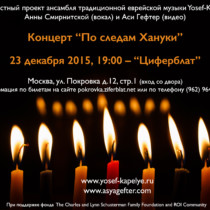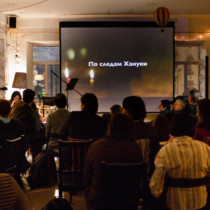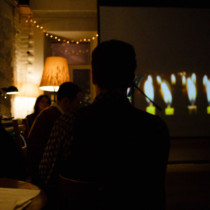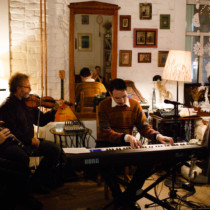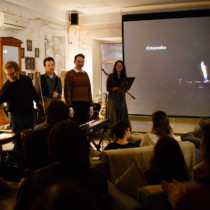Collaboration with Moscow Klezmer Ensemble “Yosef-Kapelye”, part 1 of the sequel audio-visual collaborations with award-winning musicians in Russia and Ireland (Seed to Harvest. Sukkot in Dublin), supported by The Charles and Lynn Schusterman Family Foundation, 2015
I left Moscow at the age of 21, first to the Netherlands and then the UK. It took me years to discover the medium of film and photography to express my thoughts and feelings. My cousin Anya has not moved away to make a new home in a different country. She lives in Moscow researching Music of Yiddishkayt and performing in Klezmer ensembles. I grew up hearing her play and sing in Russian, later in Yiddish. The sound of her voice is one the dearest memories I have from my ‘Russian Jewish’ childhood. Interweaving musical and visual language helped to start processing personal and historical traumas in our families and in our country of origin.
Why extra flame in the videos?
According to the article What a Syrian Hanukkah Custom Can Teach Us About Refugees, some Sephardic Jews with roots in Aleppo, Syria, have a special Hanukkah custom. On each of the eight nights of the holiday, they light an extra flame. This custom has been passed down in families whose ancestors were forced to flee Spain as refugees, when the Alhambra Decree of 1492 set in motion their expulsion for no other reason than their religious identity. Lighting the extra flame has become a hallmark of these Jews; it represents their gratitude for the safety and tolerance they encountered in their adopted homeland: Syria.
Today, Syrian Jewish communities — a blend of these Spanish refugees and others who had been living in that region since ancient times — have been resettled completely because of oppression and migration. Syria, as we know, is now also the source of a horrifying civil war and refugee crisis. Despite the adversity that Jews have faced in Syria, the lighting of an additional flame each night of Hanukkah can still serve to sensitize us to the plight of Syrian refugees, because we, too, were refugees who benefited from the compassion, acceptance and tolerance of strangers in that very land.
